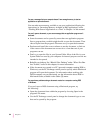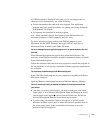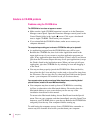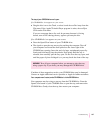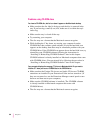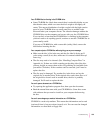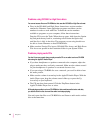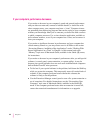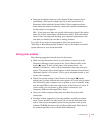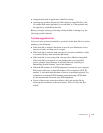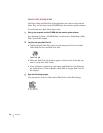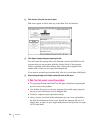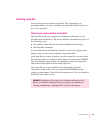
If your computer’s performance decreases
If you notice a decrease in your computer’s speed and general performance
and you often use networks, connect to bulletin boards, or share files with
other computer users, your computer may have a “virus.” Computer viruses
are potentially data-destroying programs that can be copied to your computer
without your knowledge when you or someone you share files with connects
to public computer resources. Use a virus-detection application, available at
most software retailers, to see if your computer has a virus, and to remove it
from your computer.
If you notice a significant decrease in performance and your computer has
virtual memory turned on, you may want to turn it off. Refer to the section
“Increasing Memory Available to Run Applications” under “Working With
Several Applications at a Time” in Chapter 4 of this manual and to the
“Memory” topic area of Macintosh Guide, available in the Guide (h) menu,
for instructions.
If you notice a decrease in your computer’s performance after you add special
software (a control panel, system extension, or custom utility), it may be
because your special software does not work well with Macintosh computers
built with the PowerPC microprocessor.
m To find out if your special software is the problem, hold down the Shift key
while you restart the computer. This temporarily turns off certain kinds of
software. If the computer performs better without this software, the
software is likely to be the problem.
m Use the Extensions Manager control panel to turn off a system extension or
set of extensions. For detailed instructions, see the “Customizing Your
Computer” topic area of Macintosh Guide, available in the Guide (h)
menu. If the computer performs better when an extension is turned off,
contact the extension’s manufacturer for information or an upgrade.
112
Chapter 6



